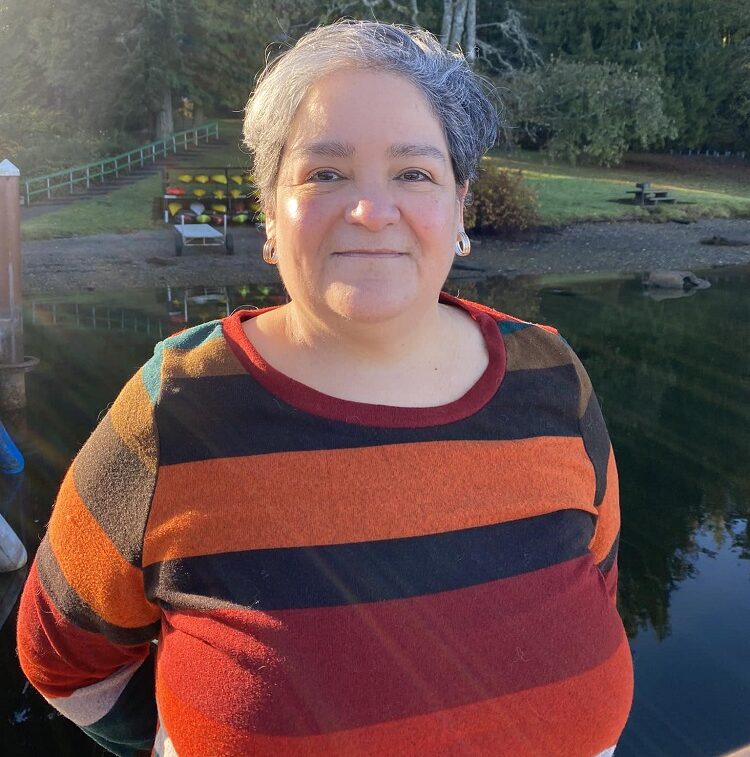“Most of my life I’ve been the only one, at every level,” Johnson told Technical.ly. “The higher you get, the more lonely it gets in terms of having other fellow Latinas and other fellow immigrants and women of color who speak another language and who have multiple experiences in different realities that are culturally based.”
Johnson was born in Guatemala and grew up in El Salvador, where education became a priority for her early on. She knew she wanted to be a public interest lawyer because she saw poverty in the community around her, and watched older family members work as lawyers to help other people.
When she moved to Puerto Rico at 14, she realized that she could go to college if she did well in school and earned scholarships. This hadn’t been an option in El Salvador, where only families who could afford it went to college. She applied for college in the United States, and ended up attending UC Berkeley.
After earning years of study, two master’s degrees and working in public health policy for awhile, Johnson decided she wanted to be more directly involved in the result of changing policies. Next up: Penn’s law school. She then chose to stay in Philadelphia to complete a fellowship focused on language access at healthcare organizations, and later, went on to work for Community Legal Services (CLS) primarily focusing on cases about benefits like food stamps, healthcare coverage and cash aid.
“They let me bring the language access specialty to CLS, and develop a strategy within CLS,” Johnson said, working with the City of Philadelphia “so that if anybody was from a large language group, they could obtain city services equally.”
https://twitter.com/Claudia46089788/status/1605306457448099841
In the early 2000s, Johnson started working at Bay Area Legal Aid as the first managing attorney for the Legal Advice Line. The goal of this line was to standardize legal advice so people from multiple counties around the Bay Area could call and speak to someone who had the expertise they needed in their language.
The process for legal aid used to involve going to a local office, getting screened by a paralegal, and if you’re lucky, seeing the lawyer that day, she said. But such a system disadvantaged people who were poor, disabled or far from the office.
“We diversified the clientele that we served,” Johnson said. “We started serving more disabled people, we started serving more non-English speaking people, just because of 1930s phone technology.”
This job made her realize that technology could really help the “access crisis” to legal expertise. She went on to take a job with Pro Bono Net to make document assembly — a questionnaire that yields legal documents — a national tool. She also helped to transition LawHelp Interactive into a place to teach courts and nonprofits how to create document assembly.
We started serving more disabled people, we started serving more non-English speaking people, just because of 1930s phone technology.
At first, she said, people questioned her choice to leave practicing law for this technology. But now, the general consensus in that document assembly is a good strategy to close the justice gap.
“I was like, ‘This could really change the way we provide services,'” she said. “I really believe that document assembly is a strategy that can be done well. It’s a solution.” The biggest reward for her has been working with partners around the country to implement the document assembly technology: “I want to see the technology is being used and shared and getting around by word of mouth.”
Thinking back to her past work with language access, she encourages legal aid groups to create forms for all the language communities they serve. The more inclusive resources are, the more people who can be helped.
Now in her mid-50s and splitting time between Maryland and Washington state, Johnson said she expected the nonprofit legal and nonprofit tech fields would be more diverse at this point, especially in leadership positions. But there’s still work to be done.
“People are going to college, people are developing the skills. I’m not the only one — there’s thousands of people, of women of color, who have busted themselves up, learning, growing, getting experiences. Really top-level people, but you don’t see them in certain circles,” she said. “I do believe it’s a lack of imagination. It’s a lack of imagining the world [that could be] because we’re living so completely separated. In the tech and legal aid world, it’s a lack of self awareness by my peers and colleagues.”
Who knows — with more Claudia Johnsons, a change might happen during her current life.







